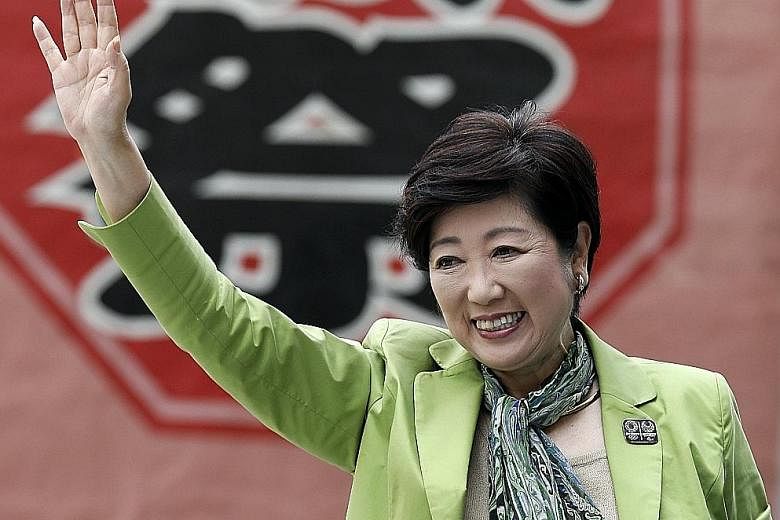Official campaigning kicked off yesterday for the Tokyo metropolitan assembly election, seen as a bellwether for national trends.
A total of 259 candidates will be vying for 127 seats in the election on July 2, which will pit the ruling Liberal Democratic Party (LDP) against rivals including the new party of Tokyo governor Yuriko Koike.
Ms Koike, 64, formerly of the LDP, is leading her new Tomin First no Kai (Tokyoites First) party into the contest, having been elected governor in a landslide win last year against an LDP candidate.
The Japanese media sees the contest as a barometer of the political fortunes of the popular Ms Koike, who is regarded as a potential premier and a threat to the LDP.
Yesterday, Ms Koike went on the offensive, pledging transparency and slamming what she described as the "black box" of LDP politics in the Tokyo assembly.
She told a rally in Shibuya: "We no longer want an old assembly that has been hiding things and with choices made to cover up."
The LDP has been saddled with a scandal after Prime Minister Shinzo Abe allegedly pulled strings to help Kake Gakuen (Kake Educational Institution), whose director Kotaro Kake is a friend, win approval for a veterinary school. The government has not green-lighted such schools for 52 years, given a glut of animal doctors.
Mr Abe's approval ratings have fallen, and the national opposition is invoking a law that compels him to reopen the Diet so he can be questioned about the scandal.
Analysts say doubts over the national scandal could spill over into the election in Tokyo, which is home to more than a tenth of Japan's population of 127 million.
While the national appetite for the opposition remains weak - many view its reign from 2009 to 2012 as hapless - Ms Koike's Tomin First is seen as a surging force, given that she was a former environment and defence minister.
In the recent Tokyo metropolitan assembly, the LDP had 57 elected members, while Komeito had 22. And despite being formed only last year, the Tomin First had six members - defectors from the LDP or other opposition parties.
For the upcoming polls, the LDP is fielding 60 candidates, followed by Tomin First's 50 candidates, many of whom are novices who graduated from a political school opened by Ms Koike last year.
Significantly, Tomin First has joined forces in the local assembly with the Komeito, the LDP's coalition partner in the national Diet. Komeito is fielding 23 candidates.
If Ms Koike's Tomin First and its allies win a majority of at least 64 seats at the upcoming election, she will have an easier time working with the assembly, compared with her first year in office as governor.
While generally popular, Ms Koike has drawn some criticism for her handling of the relocation of the iconic Tsukiji fish market. This week, she announced that the market will go ahead with a controversial move to Toyosu. But Tsukiji will be renovated, with both sites to be used together eventually.
However, the compromise has been criticised as unrealistic and scant on details, with the LDP saying it proves that she is "unable to make tough decisions".
Still, political watcher Yu Uchiyama of the University of Tokyo expects a big win for Tomin First. He said: "In the populist strategy known as the 'Koike Theatre', the LDP is being pitched as the enemy of many reforms she has advocated. The Kake scandal is to Ms Koike's favour, given her push for transparency."

